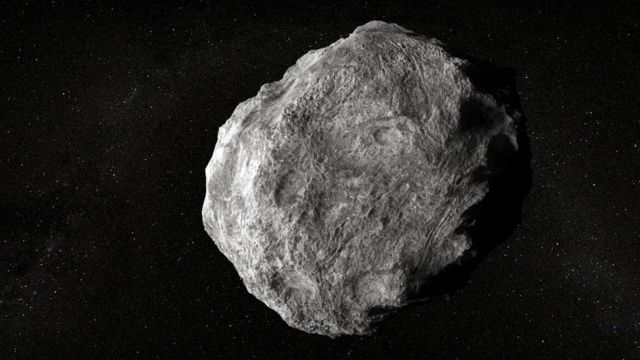ORLANDO, Feb. 1, 2013 – An asteroid, the size of half a city block, will buzz Earth’s surface on Feb. 15, squeezing by communication satellites orbiting the planet.
The University of Central Florida will host a free 1 p.m. event for the public to watch this event via feeds from telescopes in Spain, where it will be nighttime. UCF’s Humberto Campins, an international expert on asteroids who first discovered water ice and organic molecules on asteroids, has gathered three leaders in asteroid research who will give short talks about the real and sensationalized threat these rocky bodies pose. The live feeds will include telescopes at the Astronomical Observatories of Mallorca and La Sagra, Spain, where asteroid 2012 DA14 was discovered.
Confirmed guest speakers include Dr. Michael F. A’Hearn, the scientist who led NASA’s Deep Impact mission, which launched the first man-made object into the nucleus of a comet, and Dr. Harold Reitsema, a planetary scientist who is part of the B612 Foundation’s private effort to launch a telescope that will locate and track asteroids that could hit Earth. Also speaking is UCF Professor Dan Britt, an expert in out-of-this-world rocks. Every NASA rover that’s been sent to Mars, including the current Curiosity Rover, has included equipment Britt designed to help determine the makeup of rocks found on the planet. Campins also will speak and be part of the panel that will answer questions and provide commentary during the flyby. Ray Lugo, the new director of the Florida Space Institute, will moderate the panel.
NASA has identified more than 4,700 asteroids that pose a potential threat to Earth. If one of the larger ones were to collide with the planet, it would be catastrophic. But the odds are that such a collision won’t happen in this lifetime.
“But it has happened and it can happen again,” Campins said. “So as a species it is important we learn all we can about asteroids in case we have to deflect one. And there are other reasons for us to investigate. Asteroids could provide precious resources both to Earth and to space travelers, and they hold secrets to how our planet and life on it formed. That’s why these objects are getting so much attention.”
NASA, the European Space Agency and the Japanese Aerospace Exploration Agency are working on missions to fly to a nearby asteroid and collect samples. Campins is working on NASA’s OSIRIS-REx and the European Space Agency’s MarcoPolo-R missions launching in the next few years.
The presenters promise the event will give attendees plenty of interesting information about asteroids as a precursor to the special viewing. And to keep the event in a festive mood, UCF astronomers also will demonstrate a science experiment that results in an asteroid you can eat.
“We do serious work that is important,” Campins said. “And we also know how to have a little fun.” click here to see a video about the event
Members of the media also are welcomed to attend UCF’s Asteroid Encounter from 1 to 3p.m. Feb. 15. Visit www.cos.ucf.edu/asteroid for details and to register.

